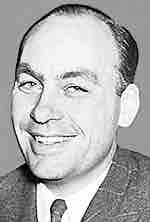The Gallup Organization
Founded by George Gallup , Gallup, Inc. is primarily a research-based, performance-management consulting company. Some of Gallup's key practice areas are - employee engagement, customer engagement, and well-being. Gallup has more than 40 offices in 27 countries. World headquarters are in Washington, D.C. Operational headquarters are in Omaha, Nebraska.
Gallup currently has four divisions: Gallup Poll, Gallup Consulting, Gallup University, and Gallup Press.
History
Gallup Inc. was founded in 1958, when George Gallup grouped all of his polling operations into one organization. After Gallup's death in 1984, The Gallup Organization was sold to Selection Research, Incorporated (SRI) of Lincoln, Nebraska in 1988. George Gallup founded the American Institute of Public Opinion, the precursor of The Gallup Organization, in Princeton, New Jersey, in 1935. He wished to objectively determine the opinions held by the general public. To ensure his independence and objectivity, Dr. Gallup resolved that he would undertake no polling that was paid for or sponsored in any way by special interest groups such as the Republican and Democratic parties, a commitment that Gallup upholds to this day.

George Gallup
George H. Gallup was the founder of the Gallup Poll.
In 1936 Gallup successfully predicted that Franklin Roosevelt would defeat Alfred Landon for the U.S. presidency; this event quickly popularized the company. In 1938 Dr. Gallup and Gallup Vice President David Ogilvy began conducting market research for advertising companies and the film industry. In 1958 the modern Gallup Organization was formed from a merger of several polling organizations. Since then, Gallup has seen huge expansion into several other areas.
Gallup died on November 21, 2011.
Gallup Poll
The Gallup Poll is the division of Gallup that regularly conducts public opinion polls in more than 140 countries around the world. Gallup Polls are often referenced in the mass media as a reliable and objective measurement of public opinion. Gallup Poll results, analyses, and videos are published daily on Gallup.com in the form of data-driven news.
Historically, the Gallup Poll has measured and tracked the public's attitudes concerning virtually every political, social, and economic issue of the day, including highly sensitive or controversial subjects. In 2005, Gallup began its World Poll, which continually surveys citizens in more than 140 countries, representing 95% of the world's adult population. General and regional-specific questions, developed in collaboration with the world's leading behavioral economists, are organized into powerful indexes and topic areas that correlate with real-world outcomes.
Gallup Polls are best known for their accuracy in predicting the outcome of United States presidential elections. Notable exceptions include the 1948 Thomas Dewey-Harry S. Truman election, where nearly all pollsters predicted a Dewey victory. The Gallup Poll also inaccurately projected a slim victory by Gerald Ford in 1976, where he lost to Jimmy Carter by a small margin. For the 2008 U.S. presidential election, Gallup was rated 17th out of 23 polling organizations in terms of the precision of its pre-election polls relative to the final results.
In 2008, Gallup interviewed no fewer than 1,000 U.S. adults each day, providing the most watched daily tracking poll of the race between John McCain and Barack Obama.Gallup also conducts 1,000 interviews per day, 350 days out of the year, among both landline and cell phones across the U.S. for its health and well-being survey.